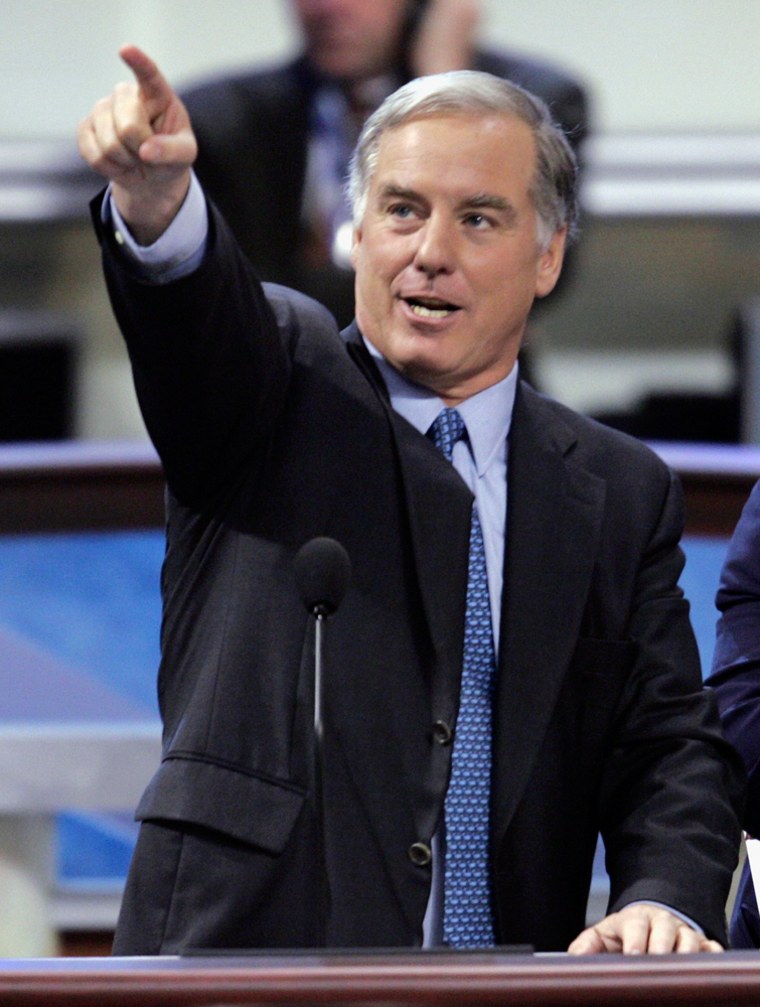Howard Dean’s presidential campaign crashed and burned in the snows of Iowa and New Hampshire last January, but on Tuesday afternoon Dean’s white-hot rhetoric fired up a ballroom full of 500 supporters at the Royal Sonesta Hotel in Cambridge, Mass.
The overflow crowd was so big that the fire marshal stopped any more people from entering.
The former front-runner for the Democratic nomination then gave a second speech to a crowd outside the hotel.
Alluding to John Kerry’s call for muting of anti-Bush rhetoric, Dean said “there’s a few of us” who had called President Bush a “fascist,” but then added Democrats are “not trying to do that, this week anyway.”
He instead said that America was “less safe since Saddam Hussein was captured,” and repeated that phrase just in case anyone missed it the first time.
It was such rhetoric last December that prompted Sen. Joe Lieberman to say that Dean had "climbed into his own spider hole of denial if he believes that the capture of Saddam Hussein has not made America safer."
Dean pledged in his speech Tuesday to work to elect his former rival Kerry.
Familiar rhetoric
But while not mentioning Kerry or any other Democratic leader by name, Dean doled out rhetoric of the kind he used last year to denounce fellow Democrats, blaming “the Democratic Party for not standing up to George Bush three years ago.”
Dean also indulged in some bashing of the news media and praised Teresa Heinz Kerry for telling an editor Sunday night to “shove it,” after he questioned her about using the phrase “un-American” to describe some modern campaigning.
“Kerry is going to win the election because of his wife — she’s fantastic! Isn’t she great?” Dean exulted.
He urged his followers to continue forging a revolution in how campaigns are run: “The future of this country is about two-way campaigns, campaigns where candidates are not guided by focus groups and polls, they’re guided by blogs and people who go to Meetups.”
The former Vermont governor, who was criticized early this year by North Carolina Sen. John Edwards for saying he wanted to win the support of white Southerners who drove pickup trucks and had Confederate flag decals on their bumpers, reverted to his theme of liberal Democrats needing to run candidates in the South.
“We can not be a national party unless we are willing to take our case to Mississippi and Utah and Alabama and Texas,” he said, adding that “we need to take the progressive message to Mississippi,” because voters in that state have the same economic interests as voters do in Massachusetts.
'Guns, God and gays'
Mississippi voters are ultimately “going to get tired of voting on guns, God and gays and starting voting on education and health care.”
Despite his national profile, Dean is thinking locally, using his political action committee to fund like-minded Democrats who will run for school boards and library boards.
“The way the Republicans beat us is that years ago they started to make sure that somebody ran for the school board, somebody ran for county commission, and somebody ran for every single office you could think of, right on up to president of the United States. We didn’t do that.”
“I want you to run for office,” Dean told his loyalists, mentioning that his political action committee is supporting a candidate for library trustee. “People say, 'Jeez, Howard, I can’t believe you’re involved in a campaign of a guy who is running for library trustee.’ Well, I think library trustees are pretty important positions in an administration where they like book burning better than reading books.”
Some dreaded Dean
Such rhetoric is one reason why nine months ago influential Democrats inside the Beltway dreaded the idea of Dean winning the nomination.
Will Marshall, president of the Progressive Policy Institute and an advocate of pragmatic centrism, told MSNBC.com Tuesday, “I was going around last fall and winter before Iowa in a state of Dean-induced depression.”
“Dean had clearly tapped into a deep vein of antipathy and anger toward Bush and was skillful in turning that against his fellow Democrats as well,” Marshall recalled. “And he shot up in the polls by a skillful conflation of anti-Bush and anti-war sentiment.”
At the peak of his power last December, Dean warned Democratic leaders that his followers might sit out the election if the party denied him the nomination.
"If I don't win the nomination, where do you think those million and a half people, half a million on the Internet, where do you think they're going to go?" he said. "I don't know where they're going to go. They're certainly not going to vote for a conventional Washington politician."
That’s not the tune Dean sang Tuesday. Instead, he urged his fans to vote for Kerry and his message seemed to be getting through.

A 'Deaniac' for Kerry
Former Dean campaign volunteer Robin Battson of Columbia, S.C., who sported a “Deaniac for Kerry” button on her “Dean for America” tee-shirt as she waited to hear Dean’s speech Tuesday afternoon, explained her current support for Kerry by saying, “Well, it’s kind of a matter of we have to, this year, to change the administration,” she said. “We all need to come together, Dean supporters, Kucinich supporters, previous Nader supporters.”
Battson said her opposition to the war in Iraq was what drew her toward Dean last year. Asked whether Kerry’s support for the October 2002 Iraq war resolution was a problem for her, Battson said, “For some people it is a problem, but we probably need to be pragmatic about what was going on in Congress at that time.”
For Democratic centrists such as Marshall, Dean’s demise was an example of Democrats recognizing the “need to be pragmatic.”
“There was almost a collective decision in the Democratic mind to say, ‘OK, this guy (Kerry) will do,’” Marshall said. “I’m not saying that everybody fell in love with Kerry, but they looked at him and said, ‘He can do it; he is the most plausible in this field, certainly a more plausible challenger to George Bush than Howard Dean.’ Kerry was the beneficiary of a kind of sober decision by tens of thousands of Democratic activists that the most important imperative was to beat George Bush, not to indulge in votes that made you feel good or stoked your feelings of anger.”
